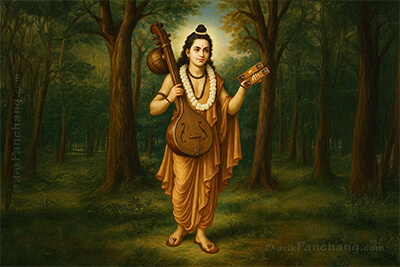 Drik Panchang
Drik Panchang



 Drik Panchang
Drik Panchang



In Hinduism, Lord Vishnu is one of the most prominent deities. Not just He is among the Trinity, that is Lord Brahma, Lord Vishnu and Lord Mahesha, He is also worshipped within the Panchadeva Upasana. In Hindu religion, Panchadeva Upasana has special significance, under which Lord Ganesha, Lord Shiva, Lord Vishnu, Goddess Durga and Sun God are worshipped. Lord Vishnu assumes various incarnations to fulfill different reasons and specific purposes. According to Srimad Bhagavata Mahapurana, Lord Vishnu incarnated as Sage Narada to bestow the teachings of Satvata Tantra. Satvata Tantra is also known as Narada Pancharatra. In the Narada Pancharatra, Sage Narada expounded that the liberation from the bonds of Karma can be attained through Karma itself.

Lord Krishna articulated in the twenty sixth verse of the tenth chapter of Srimad Bhagavad Gita that - "Devarshinam Cha Naradah।" In other words, "Among divine sages, I am Narada." According to the Hindu Purnimanta calendar, Sage Narada incarnated on the Krishna Paksha Pratipada Tithi of Jyeshtha month. The followers of Hinduism celebrate this day as Narada Jayanti.
As mentioned in the scriptures, the divine Sage Narada is said to have been born on various occasions in different forms. The texts describe that He took birth seven times, each in a distinct form and era. According to Srimad Bhagavata Mahapurana, Lord Vishnu, in His third Avatara, incarnated as Sage Narada.
According to Srimad Bhagavatam, Sage Narada first manifested from the Lap of Lord Brahma, and thus He became known across the world as the mind-born son - Manasaputra of Lord Brahma. The Brahmavaivarta Purana, however, states that Sage Narada appeared from the Throat of Lord Brahma.
Lord Brahma decreed Sage Narada to assist Him in the creation of Universe. However, Sage Narada expressed the desire to follow the path of Lord Vishnu's Bhakti and declined Lord Brahma's command. Enraged with Sage Narada's defiance, Lord Brahma condemned Him to be born in Gandharva Yoni. As a result of Lord Brahma's curse, Sage Narada lost his divine knowledge and born as a Gandharva named Upabarhana.
In the course of time, Upabarhana grew into a youth of exceptional charm and beauty, equivalent to that of Kamadeva. Enchanted by his appearance, fifty Gandharva maidens, the daughters of a Gandharva named Chitraratha, became enamored of Upabarhana. Chitraratha married off all his fifty daughters to Upabarhana. Upabarhana led a long life of opulence with his fifty wives.
Once, Upabarhana appeared in the royal court of Indra, where Lord Brahma was also present. Among those in attendance was Rambha, a beautiful celestial nymph. Enchanted by her beauty, Upabarhana was overcome with intense desire and could not take his eyes off her, failing to offer his salutations to Lord Brahma. Affronted with Upabarhana's behavior, Lord Brahma condemned Him to be born on Earth as a Dasiputra, that is the son of a maidservant.
Due to the previous curse of Lord Brahma, Upabarhana was filled with lust and intense desire. However, he retained complete memory of his past births by virtue of his devotion to Lord Narayana. Therefore, Upabarhana, with his Yogic powers, laid down his life and after which he was born on Earth as the son of a maidservant.
Before Sage Narada's birth as a son of maidservant, his father passed away, and his mother too departed from this world when he was still a child. In this birth also, Sage Narada retained memories of all events from his previous lives. As a son of maidservant, Sage Narada sustained himself by seeking alms.
After some time, a group of ascetics arrived in his village. They arrived with the purpose of observing the four-month Chaturmasya there. By virtue of his devotion to Lord Vishnu, Narada had been deeply religious since his childhood. He began spending most of his time in the pious company of those sages, attentively observing their ways, and readily offering his service to the best of his ability. Whenever the sages recited Srimad Bhagavata Katha, Narada would listen with reverence. After the ascetics had taken their meals, He would devotedly eat the remaining portion of the food known as Shita Prasadi.
As Narada devoted himself to serving the sages, His sins gradually absolved and a profound sense of devotion awakened in His heart. As the sages prepared to leave the village, they were pleased with the service of Narada and imparted to Him the significance of chanting the name of God and meditating upon it. Narada, wholeheartedly following the guidance of the sages, retired to a dense forest and sat in deep meditation, focusing His mind on the feet of Lord Vishnu.
One day, Lord Vishnu manifested within the heart of Sage Narada, gave Him Darshan for a fleeting moment and promptly disappeared. As a result of this divine manifestation, a profound sense of devotion again awakened in His heart, and He began meditating upon Lord Vishnu with a restless heart. But, due to the divine design of Lord Vishnu, Sage Narada, with all His efforts, could not meditate upon the Lord.
Thus, seeing the intense restlessness of Sage Narada for Lord Vishnu's grace, a celestial voice reverberated from the sky - "O Narada! In this lifetime, you shall not see me again. Therefore, in your next birth, you will be born as my divine messenger."
When the right time came, Narada relinquished the mortal world where He was born as a son of maidservant and His soul merged with Lord Brahma. Thereafter, for the duration of one Kalpa, Narada's soul remained within Lord Brahma and at the end of the Kalpa, He once again manifested as the mind-born son of Lord Brahma in His lap. In that birth too, He became known in the entire universe as Narada and with His ascetic power and unwavering devotion, He attained the status of Brahmarshi.
Thus, as the consequence of Lord Brahma's curse, Sage Narada was born in various forms in different time periods. But, with his profound devotion toward Lord Vishnu and His ascetic power, He attained the status of Devarshi and Brahmarshi.
Sage Narada is the mind-born son of Lord Brahma. Sages Atri, Angirasa, Pulastya, Marichi, Pulaha, Kratu, Bhrigu, Vashishtha and Daksha are His brothers.
Sage Narada is depicted as an ascetic, who holds a Veena in His one hand and a Kharatala in the other. He is shown with a happy countenance, always chanting Narayana-Narayana. Sage Narada is of fair complexion and wears Vaishnava symbols on His body.
Shri Narada Stuti -
भवजलनिधिमग्नं जीवजातं निरीक्ष्य
परमकरुणमूर्तिः श्रीमुकुन्दो महीयान्।
कृत मुनिवर मूर्तिः पञ्चरात्रं वित्तन्वन्
स जयति गुरुवर्य्यो नारदो नारदाता॥
Bhavajalanidhimagnam Jivajatam Nirikshya
Paramakarunamurtih Shrimukundo Mahiyan।
Krita Munivara Murtih Pancharatram Vittanvan
Sa Jayati Guruvaryyo Narado Naradata॥